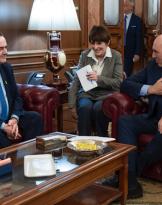Enhancing the relationship with Africa and acting as a bridge with its history and culture, in reciprocal differences: this is the purpose of the inter-parliamentary section inaugurated this Tuesday, 23, in the frame of the Senate of the Republic, in a meeting held between representatives of the institutions and representatives from different West African countries. This step is preparatory to a deepening of relations between Rome and the French-speaking states of the west of the continent, which already have a long history of friendship and collaboration between them.
The promoter of the initiative was the president of the inter-parliamentary section, Senator Fazzolari of Fratelli d'Italia, but there were many deputies and senators to intervene; among the best known are Piero Fassino, former Minister of Foreign Trade, and Stefania Craxi, Undersecretary for Foreign Affairs in the government of Mario Monti. There are also numerous diplomatic representations of African countries, from the ambassador of Ghana, Evelyn Anita Sokes-Hayford, to the representative of Benin, His Excellency Evelyne Togbe-Olory.
For the Ministry of Foreign Affairs there was the director of the Sub-Saharan Africa section, the plenipotentiary minister Giuseppe Mistretta, and the cabinet chief of the foreign minister Moavero, the ambassador Guariglia.
The creation of the interparliamentary friendship section takes place at a particularly delicate moment for relations between Italy and the West African countries. In addition to the migration issue, in fact, our country has to face ever more the geostrategic challenges related to the stability of this region in which, we recall, France has always been the main international protagonist. The attention of the Italian government to the area is also due to the growing commitment on the part of the European Union, which is trying to develop its own comprehensive development and security strategy parallel to the French one. But the reason why the political exchange between Italy and these African countries is important, as emphasized by all the speakers present at the meeting, is not only related to security, but touches on the growing importance of economic and cultural exchanges between our nations. An example of this is the surge in investments by Italian companies in the states in question, which are now so significant that they make our country the fourth or fifth economic partner for many sub-Saharan governments.
 Import and export through the Mediterranean and beyond the Sahara is also remarkable, given that we are now talking about figures that almost total the value of half a billion euros a year. As far as culture is concerned, the dossiers on the table are equally numerous, and, although Parliament cannot be the main actor of these initiatives, it is nevertheless possible that deputies and senators can, in concert with their colleagues in charge of the commission, bring term incisive actions. A proposal in this sense was presented by the Hon. Sittorio Sgarbi, present at the event, who underlined how it is possible to think for example of the valorisation of African art, much of which is currently in the possession of Great Britain and France but probably relaunched shortly at home, perhaps giving it a place of honor on display along with the Italian Renaissance.
Import and export through the Mediterranean and beyond the Sahara is also remarkable, given that we are now talking about figures that almost total the value of half a billion euros a year. As far as culture is concerned, the dossiers on the table are equally numerous, and, although Parliament cannot be the main actor of these initiatives, it is nevertheless possible that deputies and senators can, in concert with their colleagues in charge of the commission, bring term incisive actions. A proposal in this sense was presented by the Hon. Sittorio Sgarbi, present at the event, who underlined how it is possible to think for example of the valorisation of African art, much of which is currently in the possession of Great Britain and France but probably relaunched shortly at home, perhaps giving it a place of honor on display along with the Italian Renaissance.
Knowledge and collaboration between Italian parliamentarians and those of other countries in bilateral or multilateral initiatives is not new, but it is a good practice that comes from the past and that has often made contact between governments and multilateral institutions easier. Unlike the more official channels, this collaboration has always allowed more informal and more political contacts between the States, and therefore it has not infrequently opened the way to initiatives that otherwise would not have seen the light, such as for example the start, in the case of the African States, of many development aid projects during the last legislature. The dizzying growth of some African economies, moreover, opens up new scenarios in front of us and perhaps also brings us a little hope, given that many of the problems of those countries are due, as is known, precisely to a lack of social and economic growth, combined with an unprecedented demographic boom. The creation of this section is therefore another element in the construction of a relationship of trust which has become indispensable for Italy and its foreign policy.













